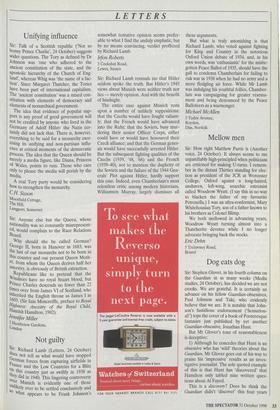Sir: Richard Lamb reminds me that Hitler seldom spoke the
truth. But Hitler's 1945 views about Munich were neither truth nor lies — merely opinion. And with the benefit of hindsight.
The entire case against Munich rests upon a number of unlikely suppositions: that the Czechs would have fought valiant- ly; that the French would have advanced into the Ruhr; that the Soviets, busy mur- dering their senior Officer Corps, either could have or would have honoured their Czech alliance; and that the German gener- als would have successfully arrested Hitler. But the subsequent fighting qualities of the Czechs (1939, '48, '68) and the French (1939-40), not to mention the duplicity of the Soviets and the failure of the 1944 Gen- erals' Plot against Hitler, hardly support this case. Indeed, even Chamberlain's most relentless critic among modern historians, Williamson Murray, largely dismisses all these arguments.
But what is truly astonishing is that Richard Lamb, who voted against fighting for King and Country in the notorious Oxford Union debate of 1934, and, in his own words, was 'enthusiastic' for the misbe- gotten Peace Ballot of 1935, should have the gall to condemn Chamberlain for failing to risk war in 1938 when he had no army and a mere fledgling air force. While Mr Lamb was indulging his youthful follies, Chamber- lain was campaigning for greater rearma- ment and being denounced by the Peace Balloteers as a warmonger.
Michael McAllen
5 Tudor Avenue, Roydon, Diss, Norfolk


















































































 Previous page
Previous page